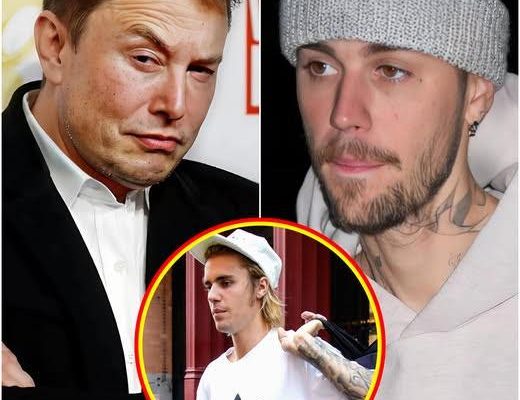In a remarkable development that has captured the attention of fans and media outlets around the globe, pop icon Justin Bieber has announced his decision to sell all his properties located in red states, following a contentious altercation with billionaire entrepreneur Elon Musk.
This unexpected turn of events has unfolded rapidly, prompting Bieber to disclose his intention to leave the United States altogether—a choice that has ignited considerable debate, speculation, and intrigue among millions worldwide.
Justin Bieber, who rose to international fame as a teenage sensation and continues to be one of the most influential figures in the music industry, has built an impressive real estate portfolio across the nation. However, he has recently revealed the challenging decision to divest his holdings in predominantly conservative states, attributing this move to intense personal and professional pressures stemming from his conflict with Musk.
The clash between Bieber and Musk took many by surprise, leaving both fans and the public astonished. Musk, the outspoken CEO of Tesla and SpaceX, as well as the owner of the social media platform X (formerly Twitter), reportedly engaged in a heated argument with Bieber, rooted in personal and ideological differences that quickly escalated.
While the specifics of their confrontation remain somewhat unclear, sources close to both parties indicate that significant tensions arose over political and social matters. In a heartfelt public statement, Bieber conveyed his frustration and disappointment, explaining that the pressures resulting from his dispute with Musk compelled him to reevaluate his living situation.
“I never anticipated that personal disagreements would escalate to this level,” Bieber candidly stated. “However, recent developments have made it untenable for me to retain my properties in certain states, and departing the U.S. seems to be the most prudent choice for me at this time.”
Bieber’s recent choice has led to notable real estate activities, as his prominent properties in states such as Texas, Florida, and Tennessee have been quickly listed for sale, generating headlines in both local and national news outlets.
These opulent residences, each valued in the millions, have garnered significant interest from prospective buyers eager to acquire homes that once belonged to one of the most renowned pop stars globally.
Public response to Bieber’s bold announcement has been sharply divided. Supporters have come forward to commend him for prioritizing his personal values and mental well-being over material wealth and financial success.
Many fans have shown considerable empathy towards Bieber, highlighting how the intense scrutiny and pressures related to his conflict with Musk could understandably affect his decision-making.
On the other hand, critics have accused Bieber of overreacting or staging a publicity stunt, casting doubt on his motivations and authenticity. Detractors suggest that the dramatic nature of his announcement indicates an exaggerated reaction to a personal issue, implying that his choice to leave the U.S. may be more of a strategic public relations maneuver than a genuinely necessary life decision.
Industry analysts are closely observing Bieber’s announcement, acknowledging the potential financial and professional ramifications of his actions. The significant sale of his properties in Republican-leaning states could impact local real estate markets, potentially altering property values, public perceptions, and investment trends in those areas.
Real estate experts point out that the rapid sale of Bieber’s luxury homes highlights the considerable influence celebrities have in the market, particularly when they make high-profile decisions based on personal beliefs or public controversies.
Bieber’s intention to leave the United States has ignited wider conversations regarding the impact of celebrity influence, political divides, and individual rights within American culture. His bold choice underscores the growing polarization in society, where personal and ideological clashes among prominent figures can significantly influence broader social and economic landscapes.
The situation surrounding Bieber serves as a clear example of how conflicts involving well-known personalities, such as Elon Musk, can have extensive repercussions, shaping public sentiment, market behaviors, and even decisions about where individuals choose to live.
Moreover, Bieber’s planned exit raises critical questions about the responsibilities of celebrities, mental health, and personal boundaries. The immense scrutiny and pressure faced by public figures, especially during public disputes, highlight vital discussions about privacy, emotional health, and individual autonomy.
Both fans and industry insiders acknowledge that Bieber’s announcement brings these important issues to the forefront, potentially fostering greater public empathy, support, and understanding regarding the personal choices and emotional well-being of celebrities.
Musk has largely refrained from commenting on Bieber’s announcement, with his representatives providing only brief remarks characterizing the situation as “personal disagreements” without further details. This notable reticence continues to generate speculation about the nature of the conflict, its implications, and the potential effects on both individuals and their extensive global followings.
As Bieber moves forward with his plans to leave the United States, fans and the media are keenly awaiting updates, including possible new locations for his residence. Bieber has suggested that he may relocate internationally, emphasizing personal comfort, privacy, and emotional health as key factors influencing his decision.
There is widespread speculation regarding a potential move to Canada, his country of origin, or various European destinations.
Bieber’s choice brings to light the intricate emotional challenges that celebrities encounter while dealing with personal conflicts, public controversies, and significant life decisions. His readiness to confront his personal struggles publicly and to show vulnerability emphasizes vital themes of emotional honesty, authenticity, and self-care—qualities that are increasingly appreciated by contemporary audiences.
Furthermore, Bieber’s notable real estate choices contribute to ongoing discussions about political division, the impact of celebrity influence, and individual rights in today’s American landscape. His experiences serve as a clear example of how swiftly personal and ideological disagreements among prominent figures can lead to significant decisions that affect communities, markets, and societal perceptions at large.
Ultimately, Justin Bieber’s surprising move to sell all his properties in red states and completely exit the United States transcends mere celebrity gossip. It represents essential dialogues about privacy, mental health, personal freedom, political divides, and the responsibilities of public figures, significantly influencing public discourse and societal reflections in the future.
As fans, industry insiders, and the media continue to observe Bieber’s evolving journey, his situation serves as a poignant reminder of the multifaceted challenges that celebrities face in the modern world.
Bieber’s experiences impart crucial lessons about empathy, understanding, and authentic emotional support, prompting audiences globally to critically consider how society interacts with celebrity controversies and personal challenges.
In summary, Justin Bieber’s unprecedented decision following his conflict with Elon Musk highlights significant societal reflections on celebrity influence, personal autonomy, mental health, and political polarization. His journey vividly illustrates important lessons about empathy, respect, and emotional understanding within contemporary society.



